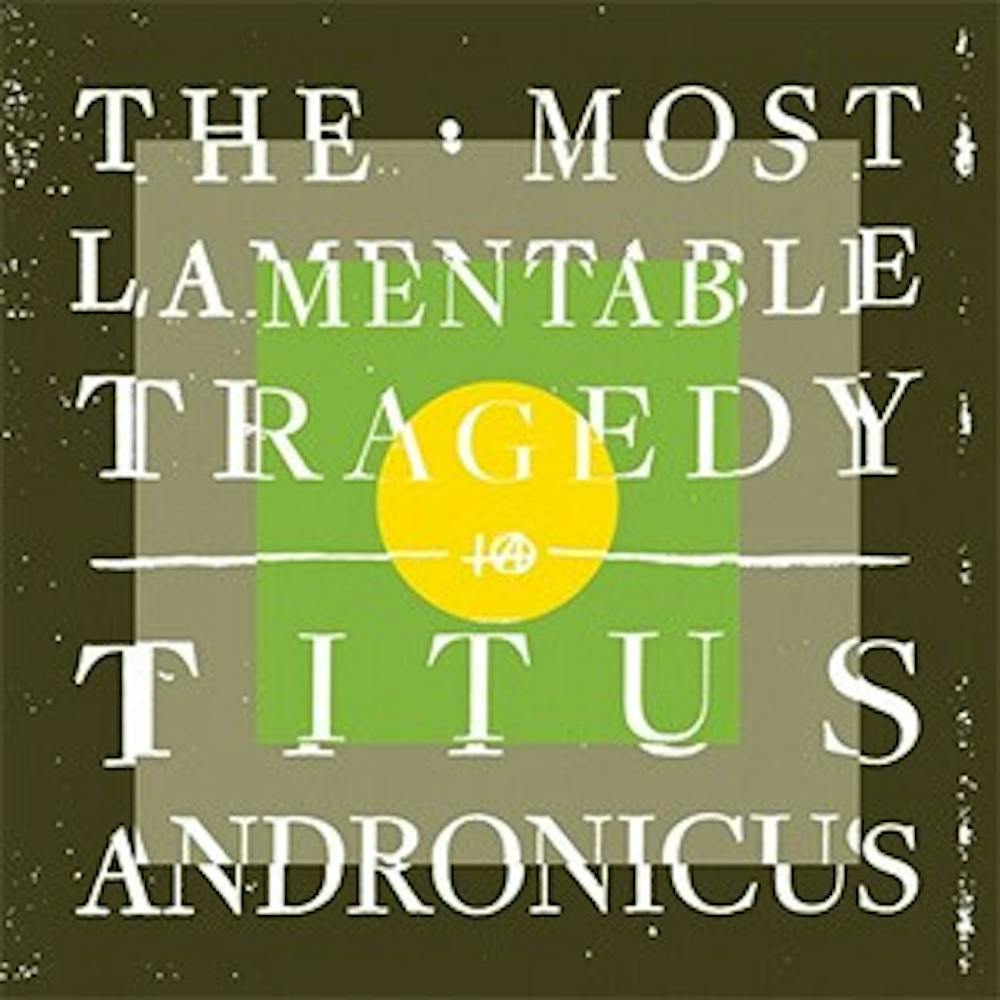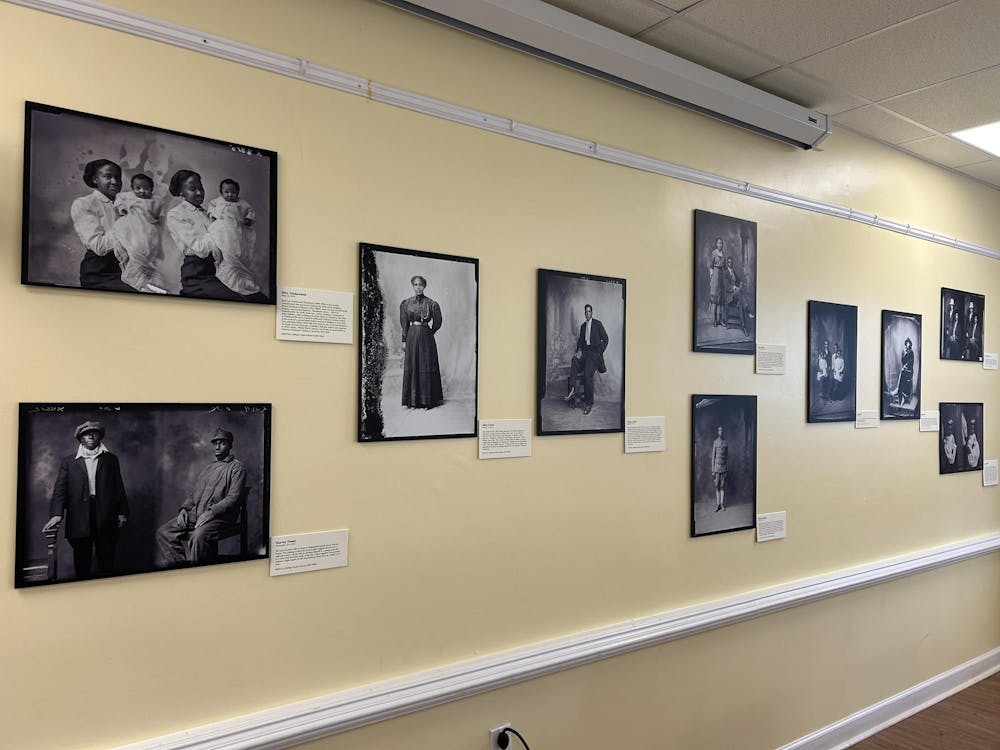New York punk rockers Titus Andronicus will be lighting up the stage at the Black Cat in Washington, D.C. Sept. 12. Arts & Entertainment caught up with dynamic lead singer, guitarist and songwriter Patrick Stickles to chat about the band’s ambitious latest album and their upcoming tour.
A&E: How do you feel about returning to D.C.? Have you ever played at the Black Cat before?
Patrick Stickles: It’s a special city for us, the capital. You figure I probably say that to everybody from every city, but it really is true. The Black Cat … that’s the biggest club we’ve ever sold out … And it happens every year! Which is a crazy thing, because in New York, where we live … we’re always thinking about what room do we need to get into to feel like we’re cool in this town. But then, as soon as we get about 200 miles south or whatever it is, we feel like real rockstars again. It’s really nice, and the Black Cat’s got a real piano up there. It’s wonderful, honestly.
A&E: Your music requires a lot of you, in terms of screaming and putting out a lot of energy. How do you manage to bring that night after night?
PS: People would always ask me “How do you scream so much night after night?” I don’t really have an answer for them, all I know is that screaming feels right, you know? So I’ve just been following a love of screaming, there’s never been any technique or anything behind it. And that extends across my entire life … I’ve lived a lot in denial of stuff, the consequences of [life] choices. And so now that I’m older, I see what’s really important to me. It’s not that I look back on my younger years with regret and say, “Oh if only I had been drinking kale smoothies instead of Miller High Lives when I was 22, maybe we’d be playing in arenas now instead of at the Black Cat.” [It’s] not that that’s the life I’d prefer —I like the Black Cat just fine, but now that I’m getting older I see that if I want to have the stuff I really want — to put on a good show for the kids, be a real rock star, get the prestige and money associated with all these things, and just have a good time rocking for my own personal satisfaction, lest we forget that part — if I want to do that to the best of my abilities, then other things need to go away.
A&E: You work some interesting references into the new album, including a “Seinfeld” reference. Can you talk about those cultural influences?
PS: People think that I’m some rock and roller and that my top 500 artists are rock and rollers, but I’ll take Larry David over all but maybe a handful of rockers. To me, Larry David is on a level with Lou Reed, and Keith Richards, Wu-Tang Clan. They’re all on the level for me along with a bunch of other people from across all the disciplines: Tina Fey would be another one of my crucial artists, or Louis C.K., the way he demands total control and gets it and does whatever he wants — huge hero to me! All these artists are the same, and I draw ideas for the art that we make from them and from every other thing we encounter. In art, in real life, it all goes into the stew. It’s all part of the harvesting of experiences.
A&E: With that in mind, would you characterize “The Most Lamentable Tragedy” as a return to your roots in terms of your artistic influences, or something new altogether?
PS: With this record, here’s the thing: it’s got this whole manic depressive theme … So that led to the question of how do we illustrate manic depression musically. How do we create a sort of bipolar effect in music, and how does that relate to the story? And of course, the answer became that the arrangements and the sonic properties of the music would reflect the mindset of the main character, as substantiated by the lyrics …The first act of the rock opera …i s all about being deeply depressed, character is experiencing a major depressive episode, and as such, the music reflects that it’s distinctly non-magical. Compare this with the second act, when our character starts to become empowered, starts to move from being depressed into being a bit more of a maniac. All of a sudden there’s phasers and stuff, flutes and violins and glockenspiels, and there’s a hundred people singing instead of one, and all of a sudden the character is not so disempowered anymore, he’s starting to become empowered … The effect should be like Dorothy stepping into the technicolor world of Oz out of the black-and-white Kansas. [After] decisions like that, that the production and the arrangements had to reflect the character’s mindset across this mood cycle … Everything else was just filling in the blanks. As a student of rock history I know a bunch of tropes, and when you combine that with the work ethic of a Lil Wayne — not to compare myself to him, because his work ethic is truly superhuman — but if you have a hunger, informed by an artist that works like Lil Wayne whose mind is enough of a diamond to just make great art nonstop … next thing you know, you’ve got this whole outline. You’ve got this inspirational work ethic thing happening. You chug away at that for a couple years, next thing you know you’ve got a 29-song rock opera right there, honey!
A&E: How did the Daniel Johnston cover become a recurring motif on the album, and what attracted you to that?
PS: I wanted to do that Daniel Johnston cover for a long time, I had the idea for that arrangement way back when I first saw that movie about him and first heard the song in that great animated sequence … So many people like Daniel Johnston … He’s so rare amongst manic-depressive or any kind of so-called mentally ill person, he has a powerful voice in society. He might not be the most famous musician ever, but he’s definitely got a lot of opportunities to express himself and to inform a lot of people about the way he perceives the world. I’m very blessed with a lot of those same opportunities. That’s all great for the artist, but anywhere, in anybody’s life, everybody should feel like they have the ability to express themselves when they need to. A lot of people spend their entire lives in silence, and keep all their feelings inside. They keep all their negativity and their fear and anxiety and shame and dread all locked inside, and it whirls around in there and turns into awful poison and then they can’t help but vomit it out at the worst possible time. I’ve done it plenty in my life, people do it everyday. But when you can talk about these things, when you can feel safe in expressing yourself and sharing what’s going on with you, you can see that you’re not the only person that feels this way, feeling that way doesn’t make you any kind of freaky monster … That’s what it’s all about basically, saying that everybody’s OK, we’re all just different. We all just need to communicate, validate, try to understand each other.
A&E: It sounds like that expression, that ending of silence, has been the band’s mission since day one.
PS: I couldn’t have told you that from day one. It’s a process of learning to articulate those sort of things, and the mission is another work in progress. It changes everyday. The manifesto is always in draft form. You’ve gotta keep it somewhat flexible and elastic, but yeah, the mission ultimately is just about validation and … just about not feeling the way that I felt most of my life, which is that I was completely alone and alienated and the world’s biggest freak. Because I wasn’t. It turns out that there’s plenty of people who felt exactly the same way that I did, and it’s awful to think about how many people, young kids out there right now, are feeling the way that I used to feel, and they don’t necessarily have to. Though I think … the internet is enabling people and empowering people to feel like they can talk about the stuff that’s really important to them, even if that stuff is not part of the system’s vision of why our society is awesome. That’s good, you know, whether that’s the destigmatization of mental illness, the destruction of the patriarchy, the disestablishment of rape culture … taking the guns away from police. All this stuff is growing more possible by the minute because of how much easier it is for people to communicate even when they’re dispersed among the so-called regular population … people seem to understand now that there’s a world out there that I didn’t know about when I was a kid … It’s a hell of time to be alive. Hopefully we’re gonna be ending a lot of different kinds of silences soon.
A&E: Getting back to the upcoming concert, will the theatricality and character elements of the album transfer into the live performance?
PS: No, not really. The truth is, our lead guitarist Adam Reich would never go for that. He’s the ultimate road dog, and he makes our set-lists and he would never let us play the same set two nights in a row ever. The thought of that drives him insane. So no, and since you’ve brought it up, it does seem pretty boring. Rock 'n' Roll … it has to be spontaneous … You know you’re gonna play G, C and D in that order, but there has to be the element of danger to it somehow, and the only theatrical production I’d want to do would be one where there were sandbags falling all the time and the set was catching on fire, if it was gonna be real Rock ’n’ Roll. Cause if we’re doing some kind of musical with 200 lighting cues, that makes it a lot harder to bust into a Billy Joel cover if we want to, or do a freestyle rap exercise, or do a 20 minute guitar solo if we want to — not that we necessarily want to do any of these things any given night, but the freedom has to be there, and the danger that anything could happen should be present somewhat.
A&E: Spontaneity aside, is there anything we can definitely expect from the show?
PS: It’s gonna be career-spanning. We’re gonna play definitely plenty of the new album, but one of the missions of the new album is to create a context wherein all of our work can exist. People get caught up like “Oh, I like this album by them not this one,” or “This one’s cool, this one sucks.” To me, it’s all the same and we try to present it as such, and hopefully the material in this rock opera will provide what other missing links need to be there for people to see the forest rather than the trees, to appreciate the cohesiveness of the body of work. We’ve got something like 50 original songs released at this point and the band knows how to play all of them, so we’re gonna play them all. Play them all!
[This interview has been edited and significantly condensed]







